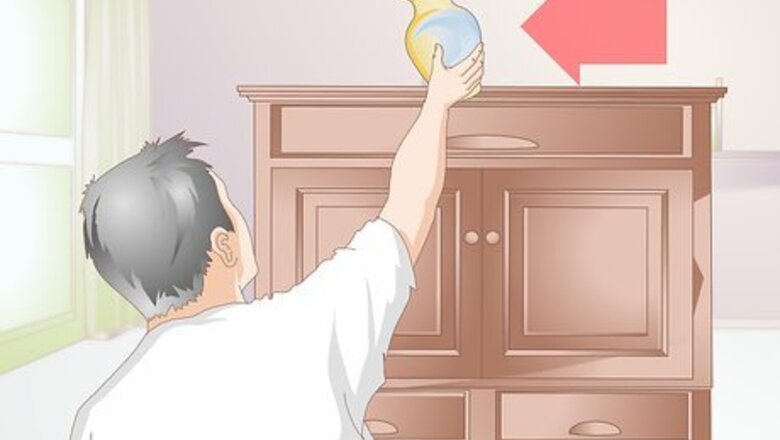
views
Keeping Your Cat Away from Things
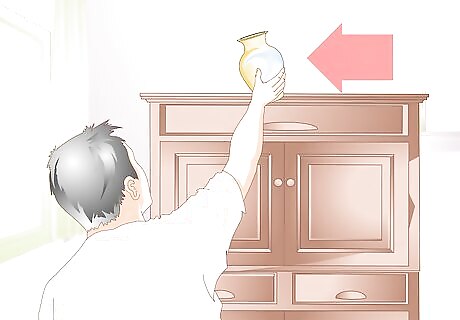
Move items to a safer location. Your cat may knock over things that are valuable or sentimental. The best way to curb this behavior is by moving the items. Put things in a spot the cat can’t reach or at a level where the risk of damage is low. This can keep your things safe and may even deter your cat from knocking them over. Place items on lower shelves where they may not break if knocked over. You could also move items to higher shelves. Keep in mind that cats love to climb and this may not ensure that a curious or adventure-seeking cat won’t be tempted to play with your items. Store collectibles, valuables, and other items that won’t survive a fall in a secured glass case. This may keep prying paws away from your things.
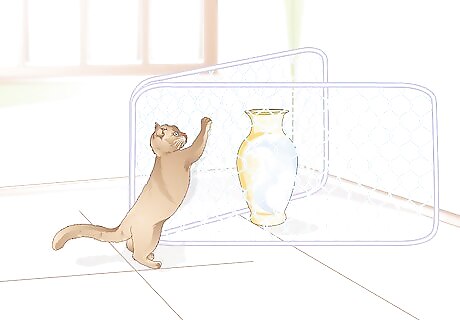
Install barriers in your home. Your cat may love knocking things over in a specific area of your home. If you want to keep your cat away from certain items or rooms, consider putting up barriers in those places. You can use things such as baby gates or doors. Figure out the places your cat most often knocks over things. It may be the bookshelves in your living room or items from your dresser. Identifying potentially attractive spots to your cat can help you purchase the best barrier. Purchase or use old baby gates to keep your cat from accessing specific rooms such as bedrooms, bathrooms, the kitchen, or your living room. Be aware that some cats can jump over baby gates, so you may want to consider options that are higher. Close the doors to any areas of your home that your cat likes to play in. For example, if your cat loves knocking things down in the bathroom, simply shut the door all day or at times when you’re not home.
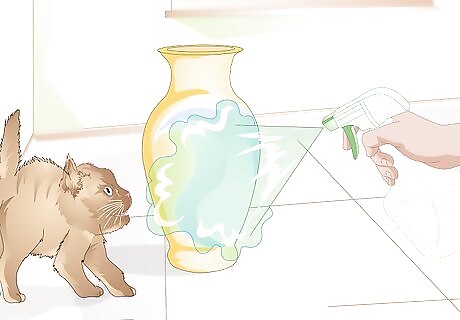
Use cat deterrents. You might consider this if your cat gains access to spaces and continues to knock over things. There are a variety of different cat deterrents you can buy that will keep your cat from knocking things over. Some common deterrents are: Deterrent sprays. Deterrent sprays give off a bad smell that cats avoid. Double-sided tape. Cats don't like walking on double-sided tape, so you can put it around objects you don't want your cat to knock over so it doesn't go near it. Noise deterrents. Noise deterrents have motion sensors, and they emit an unpleasant sound whenever cats go near them. You may also want to mix your own spray by mixing one part each of lavender, peppermint and orange oils to three parts water. Either spray attractive areas with the scent or place cotton balls soaked in it to keep your cat away.
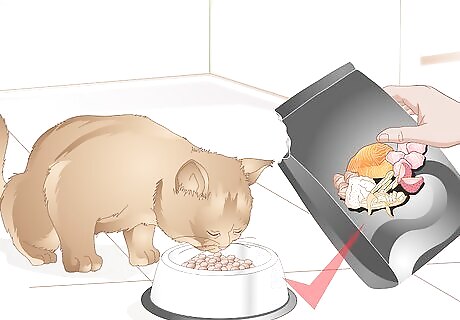
Feed your cat regularly. Cats know how to get their human’s attention when they want or need something. Many cats may knock things over because they are hungry. Making sure that your cat has fresh food and water every day may keep it from knocking over things in your home. Feed your cat on a regular schedule every day if possible. If your cat knows its time for food, it may be less likely to knock over your items. For example, feed it every morning and/ or every evening at the exact same time. Consider filling your cat’s dish with a smallish amount of dry cat food. This allows your cat to nibble throughout the day and may deter it from knocking over things to gain your attention.
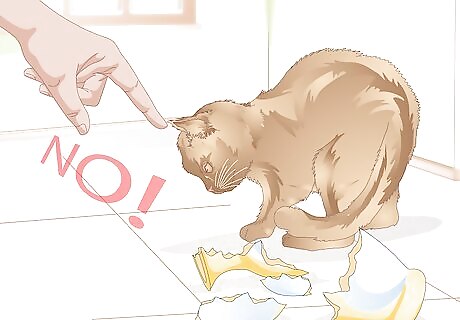
Scold your cat. If your cat breaks something or continues to knock things over, you may want to punish it. Some pet owners use physical punishment to deter behaviors. This often has little effect on the behavior. In fact, punishment can cause injury or may make the cat fear you. Instead, say, “No!,” firmly and give your cat a look of disapproval. Be consistent in your punishment. Your cat will eventually figure out that, “No!” means you don’t like her behavior. Consider reinforcing a firm, “No!,” with a squirt of water from a spray bottle right after your cat knocks something over. Recognize that a cat will continue to knock things over when you’re not home or visible. This can counteract any punishment. You can set up “booby traps” for the cat that reinforce your scolding for when you’re not at home. For example, you could put a loud beeper in a vase that makes noise when shaken or dropped. This may scare your cat and remind it not to do knock over the vase.
Redirecting the Fun
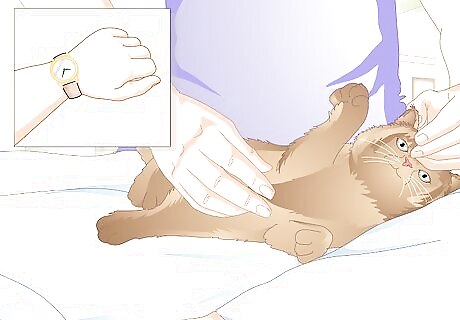
Schedule daily playtime. Cats are naturally curious, especially when they have nothing to do. Many cats will knock over things simply because they’re understimulated and bored. Making sure you spend some quality time playing with your cat every day. This may also curb its desire to knock over your things. Play with your pet at regular and spontaneous times of the day. As with meals, if your cat anticipates playtime coming, it may be less likely to behave badly from boredom. Make sure your family and friends play with your cat, too. This minimizes the risk that your cat feels like knocking things over because it isn’t getting attention.
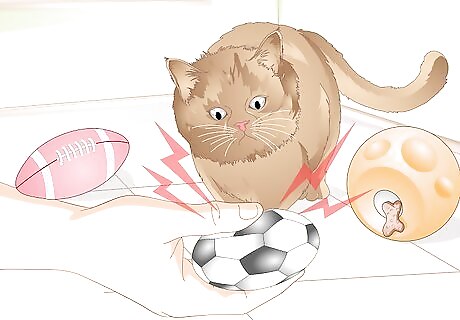
Stock up on toys. Cats love to play, especially with feline-friendly toys. If you notice your cat knocking over things frequently, take a look at its toys. If your cat doesn’t have a few toys with different types of features, purchase a few. Hiding toys throughout your home can keep your cat distracted and happy. It may also deter the cat from knocking over items in your home. Some excellent toy options for your cat are: Catnip or toys filled with catnip Squeaking or chirping plush toys Plastic balls, some with jingling bells Balled-up paper Wine corks Pieces of rope Shower rings Cardboard toilet or paper towel tubes
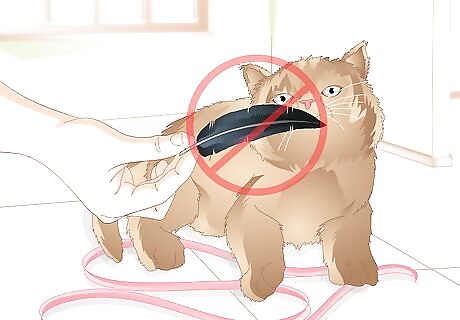
Avoid harmful toys. Toys are a great way to keep your busy, but it’s important to select ones that won’t harm your cat. Many cat toys have small pieces that your pet could swallow. This may harm intestinal issues and even cause death. Remove or store the following parts of toys to reduce the risk of harm: Ribbons or string Feathers Tinsel Sequins or other small decorations Paper clips and rubber bands Pins and needles
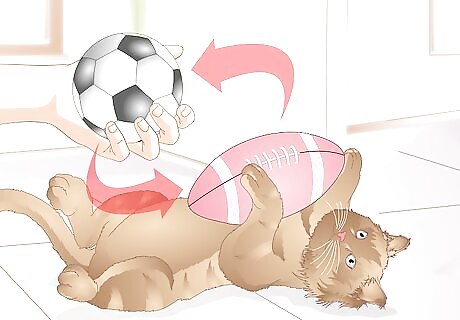
Rotate toy options often. Like humans, cats can get bored with certain toys. Rotating your cat’s toys every couple of days or once a week can keep your cat stimulated. It may also deter your cat from knocking over things around the house. Store toys where your cat can’t access them, such as a cabinet or closet. This helps maintain an element of surprise when you give your cat a toy or hide it. Make sure to rotate any toys that you hide throughout the house for your cat.
Recognizing Reasons Your Cat Knocks Things Over
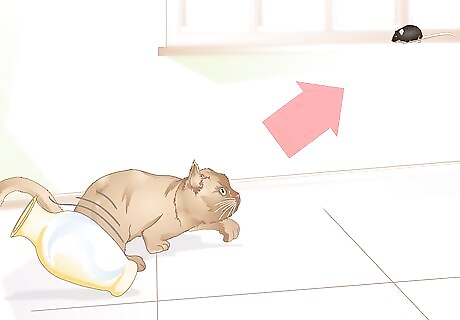
Identify why cats knock over stuff. Cats generally exhibit behaviors for a specific reason. Your cat may be knocking things over for many different reasons. These may include: Exploring surroundings Expressing prey drive Getting your attention Hunger Practicing paw maneuvers Boredom
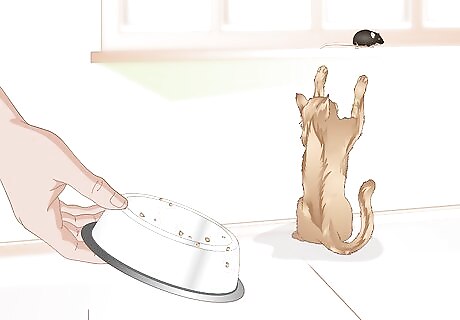
Observe your cat’s behavior. Your cat’s behavior may be related to a specific issue, such as underfeeding. Watch your cat to see when it most often knocks over your things. This can clue you into why your cat exhibits this behavior. Consider asking yourself the following questions: Does my cat do this when there is no food in its dish? Does my cat do this when there are other people or company at my home? Does my cat do this when my home is quiet and there is nothing happening? Does my cat get enough time to play? Is it allowed to express natural hunting desires?
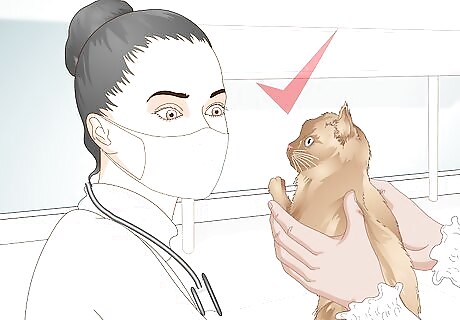
See a vet. Your cat may not respond to your attempts to deter it from knocking over things. This may be the result of a physical or mental health issue. If your cat continues to knock over things, contact your veterinarian. The vet may be able to diagnose underlying conditions and offer treatment. In some cases, your cat’s vet may refer it to an animal behavior specialist.

















Comments
0 comment